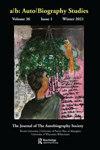Resisting Confinement Through Translation: Behrouz Boochani’s No Friend But the Mountains
Q1 Arts and Humanities
引用次数: 0
Abstract
Abstract Behrouz Boochani’s No Friend but the Mountains gives a horrifying yet poetic account of the torture he endured on Manus Island in immigration detention. His work, written in Farsi and translated into English from thousands of text messages, was first published in English so as to give voice to Australia’s dehumanizing treatment of refugees in both a national and global discourse. This essay presents No Friend as the expression of a translating|translated self, positing that it imagines new possibilities for the narration of identity and, more specifically, of Australianness. By focusing on the bordering of translation, the essay contrasts Boochani’s expression of selfhood, which integrates linguistic, geographic, and literary borders, with a national identity that relies on unbreachable borders between us and them, Australia and Manus Island. It concludes that by using translation as an origin, like No Friend does, it is possible to conceive of an inclusive and decolonizing Australia.通过翻译抵制禁锢:贝鲁兹·布查尼的《除了山没有朋友》
贝鲁兹·布查尼的《除了山没有朋友》讲述了他在马努斯岛被移民拘留时所遭受的可怕而诗意的折磨。他的作品用波斯语写成,从数千条短信翻译成英文,首次以英文出版,以便在国内和全球话语中表达澳大利亚对难民的非人道待遇。本文认为《没有朋友》是一个翻译后的自我的表达,它为身份的叙述,更具体地说,是澳大利亚性的叙述设想了新的可能性。通过关注翻译的边界,本文对比了布查尼的自我表达,这种自我表达融合了语言、地理和文学的边界,而国家身份则依赖于我们和他们之间,澳大利亚和马努斯岛之间不可打破的边界。它的结论是,像“没有朋友”一样,通过翻译作为起源,有可能设想一个包容和非殖民化的澳大利亚。
本文章由计算机程序翻译,如有差异,请以英文原文为准。
求助全文
约1分钟内获得全文
求助全文
来源期刊

a/b: Auto/Biography Studies
Arts and Humanities-Literature and Literary Theory
CiteScore
0.80
自引率
0.00%
发文量
27
期刊介绍:
a /b: Auto/Biography Studies enjoys an international reputation for publishing the highest level of peer-reviewed scholarship in the fields of autobiography, biography, life narrative, and identity studies. a/b draws from a diverse community of global scholars to publish essays that further the scholarly discourse on historic and contemporary auto/biographical narratives. For over thirty years, the journal has pushed ongoing conversations in the field in new directions and charted an innovative path into interdisciplinary and multimodal narrative analysis. The journal accepts submissions of scholarly essays, review essays, and book reviews of critical and theoretical texts as well as proposals for special issues and essay clusters. Submissions are subject to initial appraisal by the editors, and, if found suitable for further consideration, to independent, anonymous peer review.
 求助内容:
求助内容: 应助结果提醒方式:
应助结果提醒方式:


